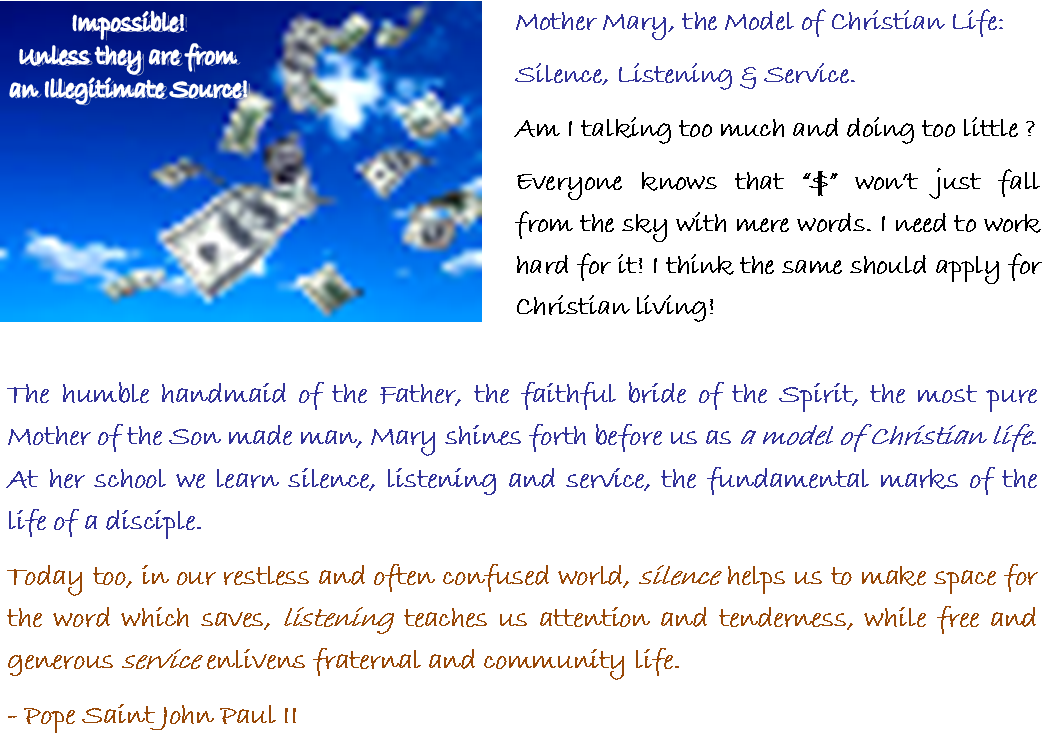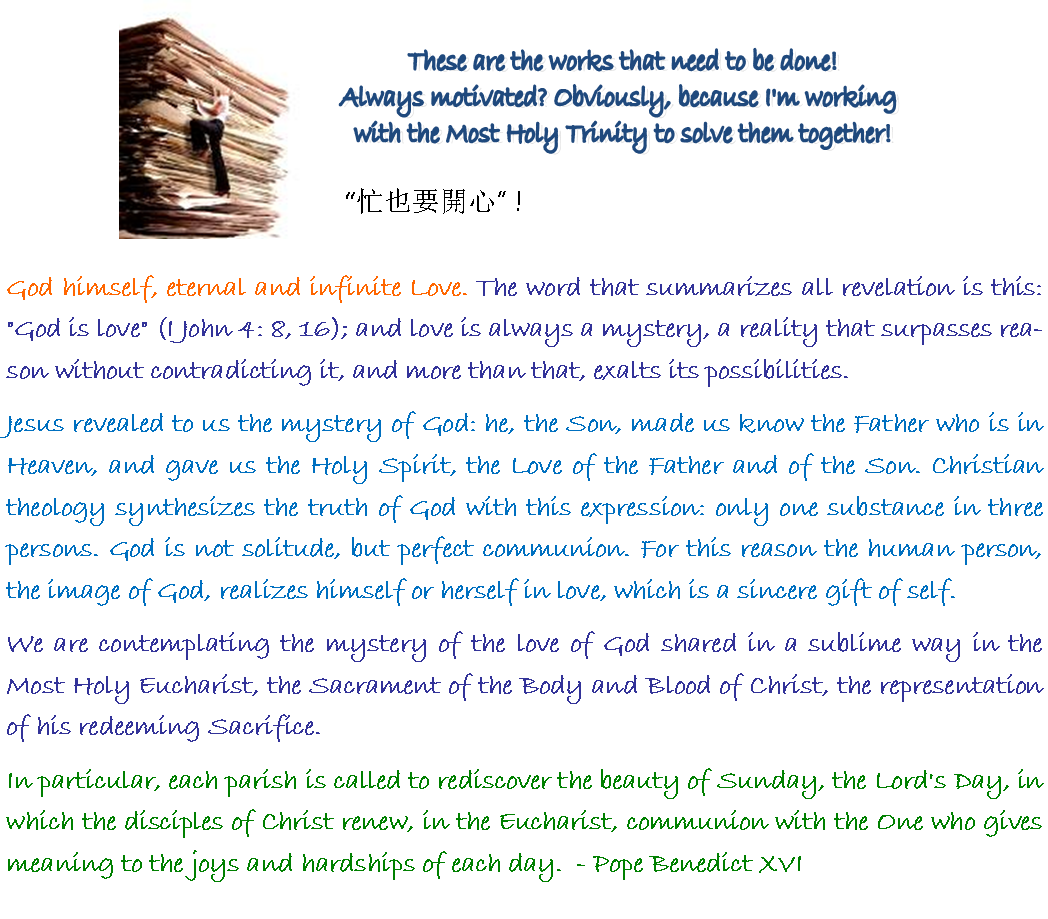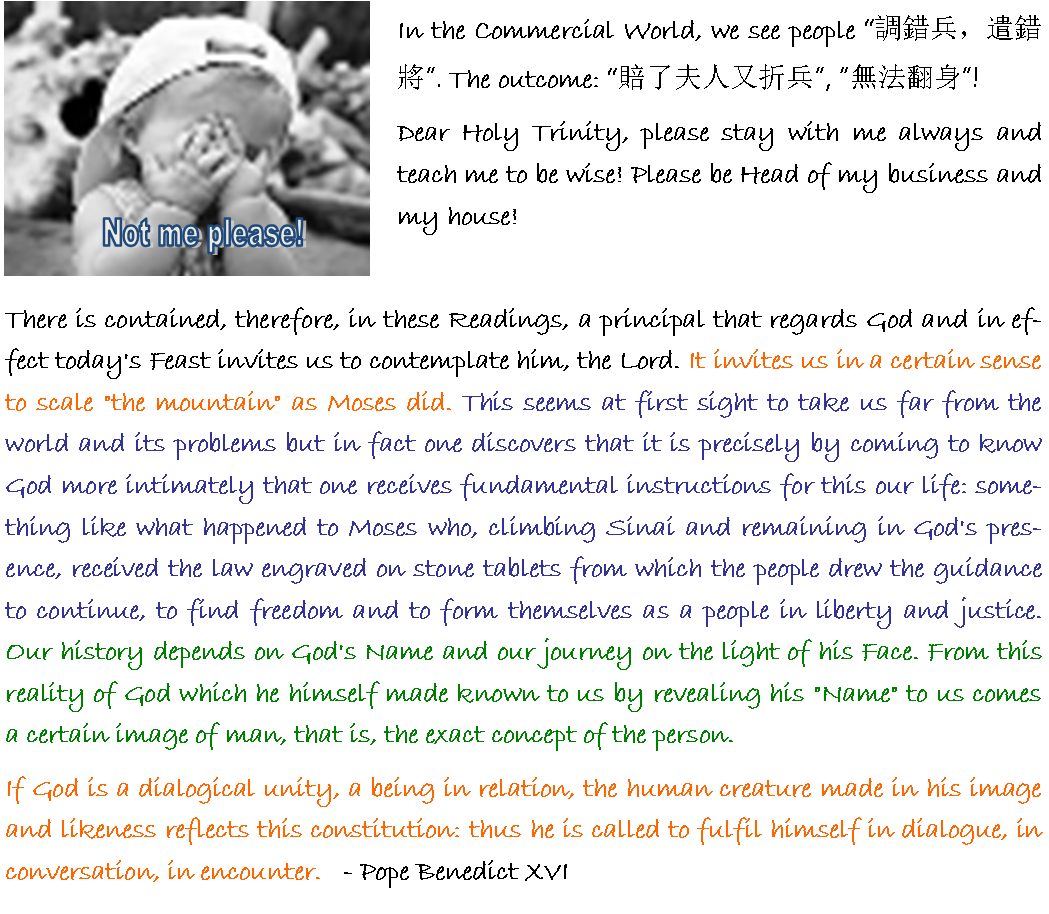|
196 |

|
I beseech her, Mother of immense charity, the precious gift of Christ Crucified, to pray for you and your families, so that your faith may remain complete, your hope firm, and your charity convincing and effective.
May Mary watch over the Christian people of Bulgaria, that they may be able to follow her Son Jesus with courage and commitment, and bear witness to him before the world by the integrity of their lives and their works!
-------------------------------------------------------------------------------
After the Angelus, the Pope greeted the faithful in French, Romanian, Serbian, Croatian, Czech and Polish.
I greet with affection the Augustinians of the Assumption, who have gathered here from different countries to celebrate the wonders the Lord worked in the lives of their martyred confreres, Kamen, Pavel and Josaphat, today proclaimed blessed.
Faithful to the motto of your founder, Fr Emmanuel d'Alzon, "Your kingdom come!", be fearless and generous in your mission of proclaiming the Good News of salvation. I cordially bless you, without forgetting the women religious of the Congregations of the Assumption family, and all those who have come with you.
I greet with affection the Romanian-speaking bishops and faithful. Dear friends, I always have vivid memories of my visit to your beloved land and of the warm welcome you gave me. They were three days of intense communion.
To everyone I say: keep your eyes fixed on Christ. He is calling you to be courageous witnesses of his Gospel. I cordially bless you all!
I extend my greeting and my blessing to all the Serbian faithful. May Christ our Lord always light up your life with the light of the Gospel.
I cordially address the Croatian pilgrims present here. May the Christian vocation to holiness be a constant inspiration for your life and work.
I also cordially greet the Czech pilgrims who are here, and accompany them with my blessing. I warmly greet my fellow citizens present here whose historical destiny has united them in a lasting way with Bulgaria, dear to Polish hearts. I ask God that in keeping intact the patrimony of faith of your ancestors and your own traditions, you may always be ready to collaborate actively with the ethnic groups and the religions that exist in this country. In prayer I entrust you all to the special protection of the Mother of God. God bless you!
At the end the Pope added in Bulgarian a word of thanks to the people of Bulgaria.
I thank you for your warm hospitality. May God bless you. Thank you.
Acknowledgment: We thank the Vatican Publisher for allowing us to publish the Homilies of Saint Pope John Paul II, so that they could be accessed by more people all over the world; as a source of Gods encouragements to all of us. |

|
BENEDICT XVI ANGELUS Solemnity of the Most Holy Trinity
Dear Brothers and Sisters,
Today, the liturgy celebrates the Solemnity of the Most Holy Trinity almost to underline that in the light of the Pascal Mystery is fully revealed the centre of the universe and of history: God himself, eternal and infinite Love. The word that summarizes all revelation is this: "God is love" (I John 4: 8, 16); and love is always a mystery, a reality that surpasses reason without contradicting it, and more than that, exalts its possibilities.
Jesus revealed to us the mystery of God: he, the Son, made us know the Father who is in Heaven, and gave us the Holy Spirit, the Love of the Father and of the Son. Christian theology synthesizes the truth of God with this expression: only one substance in three persons. God is not solitude, but perfect communion. For this reason the human person, the image of God, realizes himself or herself in love, which is a sincere gift of self.
We are contemplating the mystery of the love of God shared in a sublime way in the Most Holy Eucharist, the Sacrament of the Body and Blood of Christ, the representation of his redeeming Sacrifice. For this I am glad to address today, the Feast of the Most Holy Trinity, my greeting to the participants of the Eucharistic Congress of the Church in Italy which opened yesterday in Bari. In the heart of this Year dedicated to the Eucharist, the Christian people converge around Christ present in the Most Holy Sacrament, the source and summit of their life and mission.
In particular, each parish is called to rediscover the beauty of Sunday, the Lord's Day, in which the disciples of Christ renew, in the Eucharist, communion with the One who gives meaning to the joys and hardships of each day.
"Without Sunday we cannot live": thus professed the first Christians, even at the cost of their lives, and this is what we are called to repeat today.
In expectation of going personally to Bari next Sunday for the Eucharistic Celebration, I am already spiritually united with this important ecclesial event. We invoke together the intercession of the Virgin Mary, so that days of such intense prayer and adoration of the Eucharistic Christ enkindle in the Church in Italy a renewed ardour of faith, hope and charity.
To Mary I would like also to entrust all children, adolescents and youth who are in this period of time making their first Communion or receiving the sacrament of Confirmation.
With this intention we recite now the Angelus, reliving with Mary the mystery of the Annunciation. |

|
PASTORAL VISIT EUCHARISTIC CONCELEBRATION HOMILY OF HIS HOLINESS BENEDICT XVI Piazza della Vittoria, Genoa
Dear Brothers and Sisters,
At the end of a full day spent in your City, we are gathered around the altar to celebrate the Eucharist on the Solemnity of the Most Holy Trinity. From this central square, Piazza della Vittoria, which welcomes us for the communal service of praise and thanksgiving to God with which my Pastoral Visit concludes, I extend my most cordial greeting to the entire Civil and Ecclesial Community of Genoa. I first greet with affection the Archbishop, Cardinal Angelo Bagnasco, whom I thank for the courtesy with which he welcomed me and for his touching words at the beginning of Holy Mass. Then how can I omit greeting Cardinal Tarcisio Bertone, my Secretary of State, former Pastor of this ancient and noble Church? My most cordial thanks to him for his spiritual closeness and his precious collaboration. I next greet Auxiliary Bishop Luigi Ernesto Palletti, the Bishops of Liguria and the other Prelates. I address my respectful thoughts to the Civil Authorities to whom I am grateful for their welcome and the effective support they have lent to the preparations for and execution of this Apostolic Pilgrimage. In particular, I greet Minister Claudio Scaiola, representing the new Government, who in these very days has assumed his full functions at the service of the beloved Italian Nation. I then address with deep gratitude the priests, men and women religious, the deacons, committed lay people, the seminarians and young people. My affectionate greeting to you all, dear brothers and sisters. I extend my thoughts to those who were unable to be present and especially to the sick, to the people who are alone and to all who are in difficulty. I entrust the City of Genoa and all its inhabitants to the Lord at this solemn Eucharistic concelebration which, as on every Sunday, invites us to take part as a community in the double table of the Word of Truth and the Bread of Eternal Life.
In the First Reading (Exodus 34: 4b-6, 8-9) we heard a biblical text that presents to us the revelation of God's Name. It is God himself, Eternal and Invisible, who proclaims it, passing before Moses in the cloud on Mount Sinai. And his Name is: "The Lord, a God merciful, and compassionate, slow to anger, and abounding in steadfast love and faithfulness". In the New Testament St John sums up this sentence in a single word: "Love" (cf. I John 4: 8, 16). Today's Gospel also testifies to this: "God so loved the world that he gave his Only Son" (John 3: 16). Consequently this Name clearly expresses that the God of the Bible is not some kind of monad closed in on itself and satisfied with his own self-sufficiency but he is life that wants to communicate itself, openness, relationship. Words like "merciful", "compassionate", "rich in grace" all speak to us of a relationship, in particular, of a vital Being who offers himself, who wants to fill every gap, every shortage, who wants to give and to forgive, who desires to establish a solid and lasting bond. Sacred Scripture knows no other God than the God of the Covenant who created the world in order to pour out his love upon all creatures (cf. Roman Missal, Eucharistic Prayer IV) and chose a people with which to make a nuptial pact, to make it become a blessing for all the nations and so to form a great family of the whole of humanity (cf. Genesis 12: 1-3; Exodus 19: 3-6). This revelation of God is fully delineated in the New Testament though the word of Christ. Jesus showed us the Face of God, one in Essence and Triune in Persons: God is Love, Father Love - Son Love - Holy Spirit Love. And it is precisely in this God's Name that the Apostle Paul greets the Community of Corinth: "The grace of the Lord Jesus Christ and the love of God [the Father] and the fellowship of the Holy Sprit be with you all" (II Corinthians 13: 14).
There is contained, therefore, in these Readings, a principal that regards God and in effect today's Feast invites us to contemplate him, the Lord. It invites us in a certain sense to scale "the mountain" as Moses did. This seems at first sight to take us far from the world and its problems but in fact one discovers that it is precisely by coming to know God more intimately that one receives fundamental instructions for this our life: something like what happened to Moses who, climbing Sinai and remaining in God's presence, received the law engraved on stone tablets from which the people drew the guidance to continue, to find freedom and to form themselves as a people in liberty and justice. Our history depends on God's Name and our journey on the light of his Face. From this reality of God which he himself made known to us by revealing his "Name" to us comes a certain image of man, that is, the exact concept of the person. If God is a dialogical unity, a being in relation, the human creature made in his image and likeness reflects this constitution: thus he is called to fulfil himself in dialogue, in conversation, in encounter.
In particular, Jesus has revealed to us that man is essentially a "son", a creature who lives in the relationship with God the Father, and in this way in relationship with all his brothers and sisters. Man is not fulfilled in an absolute autonomy, deceiving himself that he is God but, on the contrary, by recognizing himself as a child, an open creature, reaching out to God and to his brethren in whose faces he discovers the image of their common Father. One can easily see that this concept of God and man is at the base of a corresponding model of the human community, and therefore of society. It is a model that comes before any normative, juridical or institutional regulations but I would say even before cultural specifications. It is a model of the human family transversal to all civilizations, which we Christians express confirming that human beings are all children of God and therefore all brothers and sisters. This is a truth that has been behind us from the outset and at the same time is always before us, like a project to strive for in every social construction.
The Magisterium of the Church which has developed from this vision of God and of man is a very rich one. It suffices to run through the most important chapters of the Social Doctrine of the Church, to which my venerable Predecessors have made substantial contributions, especially in the past 120 years, making themselves authoritative interpreters and guides of the social movement of Christian inspiration. Here I would like to mention only a recent Pastoral Note of the Italian Episcopate: "Rigenerati per una speranza viva': Testimoni del grande 'si' di Dio all'uomo" [Regenerated by a living hope: witnesses of God's great "yes" to man] (29 June 2007). This Note proposes two priorities. First of all, the choice of the "primacy of God": all the Church's life and work depend on putting God in first place, not a generic God but rather the Lord with his Name and his Face, the God of the Covenant who brought the people out of slavery in Egypt, who raised Christ from the dead and who wants to lead humanity to freedom in peace and justice. The other choice is to put the person and the unity of his life at the centre, in the various contexts in which he is deployed: emotional life, work and celebration, in his own fragility, tradition and citizenship. The Triune God and the person in relationship: these are the two references that the Church has the duty to offer to every human generation as a service to build a free and supportive society. The Church certainly does so with her doctrine, but above all through her witness which, with reason, is the third fundamental choice of the Italian Episcopate: personal and community witness in which the spiritual life, pastoral mission and the cultural dimension converge.
Continue next page ...
29 June 2014 |